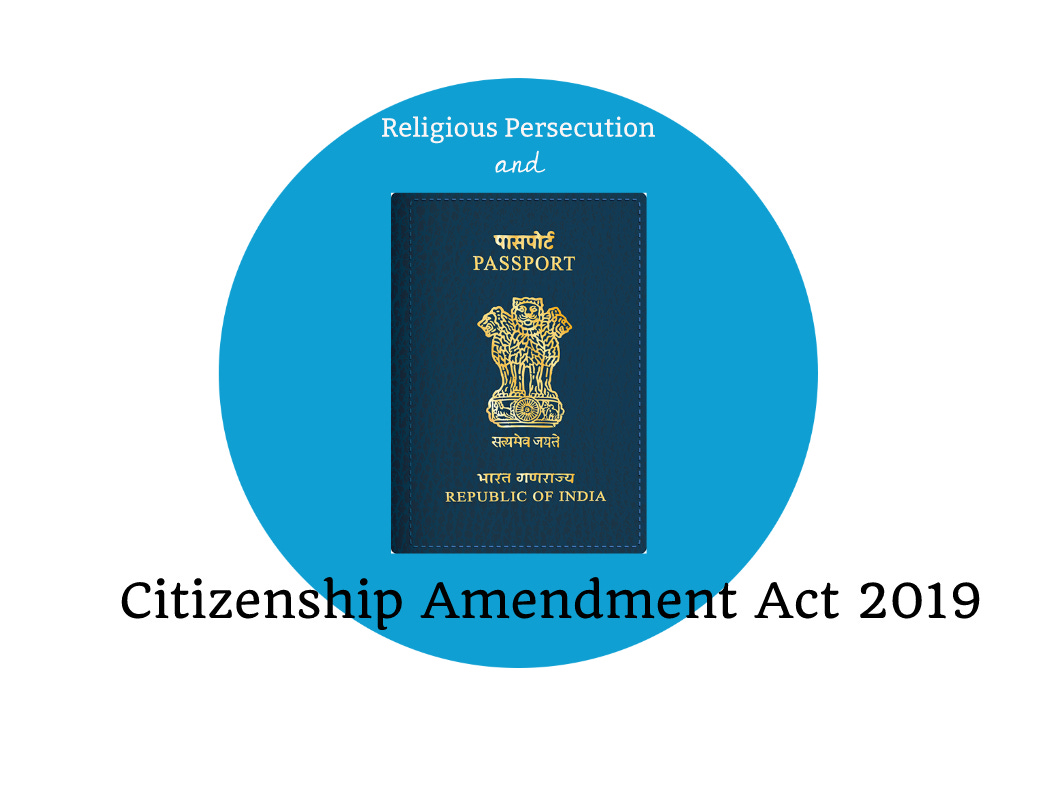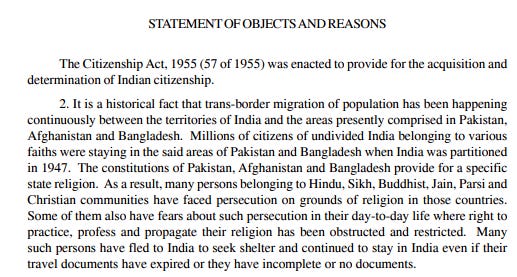Religious Persecution clause in the Citizenship Amendment Act – A Detailed Analysis

The Citizenship Amendment Act has brought up a lot of questions, one amongst them being “but, the act does not have any language on religious persecution that the act is being proposed for“. This question – and others – are being asked by laypeople with the seriousness of experienced barristers, with little or no understanding of how the judiciary system in India works. That is why it is important to discuss the Act and where the religious persecution is mentioned and how judiciary works.
Table Of Contents
Ascertaining the ‘Legislative Intent’ of a law
“The essence of law lies in the spirit, not in its letter, for the letter is significant only as being the external manifestation of the intention that underlies it” Salmond
For interpreting any law and statute in India if there is ever any ambiguity, the Judiciary looks at the “Legislative intent” of that act. There are five sources that the judges depend upon to ascertain the intent of the legislation at hand. They are:
Objects and Reasons of the Act (as published in the bill)
Parliamentary debates
Law Commission Reports (if the bill has been introduced on the recommendation of the Law Commission)
Standing Committee/ Joint/Select Committee Reports
Reports of the Committee appointed by the ministries for enacting/reviewing any existing enactments.
Let us understand what these are:
“Objects and reasons” are a critical and integral part of any legislation and are published in the bill when it is being introduced in the Parliament. Judges look at this section for ascertaining the legislative intent of any particular provision. These are considered very important. That is why when considering the provisions of any act, the corresponding bill also needs to be examined.
Law Commission Reports are created by the Law Commission. Law Commission of India is an executive body which works as an advisory body to the Ministry of Law and Justice. This body while proposing any new enactment or proposing any amendment in the existing statute, reviews the legal position on that particular aspect in India as well as in other countries. That is why Law Commission reports are considered important for ascertaining the legislative intent.
In some cases, when a bill is introduced in Rajya Sabha, the Upper House or in Lok Sabha (the Lower House) it may be referred to a Parliamentary Committee. This committee examines the bill and submits a report to the Parliament. Those reports also have critical background material to understand the intent of any act. That is why they treated as a useful source for determining legislative intent.
Finally, the Parliamentary debates. The debates in Lok Sabha and Rajya Sabha on any bill are considered integral in assessing the legislative intent of the enactment of any particular statute. It is so because these debates contain the speech given by the law minister at the time of introducing the bill and the specific discussions in the House thereafter by the members of parliament.
The Citizenship Amendment Act
The Act has the following provision with respect of who this bill is made for.
Admittedly, the Act as it was passed does not have specific reference to the “religious persecution” of these minorities in the three countries – Pakistan, Afghanistan and Bangladesh. But that has little significance in the eyes of the judiciary.
Objects and Reasons of the Citizenship Amendment Act
For, judiciary will look at the five sources to ascertain the intent of the legislation. Starting from the “Objects and Reasons of the Act” as shared in the bill presented in the parliament. And when we look at the bill that was presented in Lok Sabha, and go to the “Objects and Reasons” section of the bill, the language of the bill is clear and unambiguous.
It clearly uses the language:
The constitutions of Pakistan, Afghanistan and Bangladesh provide for a specific state religion. As a result, many persons belonging to Hindu, Sikh, Buddhist, Jain, Parsi and Christian communities have faced persecution on grounds of religion in those countries
The case for religious persecution of these communities in those countries is unambiguously stated.
Introduction and Parliamentary Debates on Religious Persecution in Citizenship Amendment Act
Ideally, the judiciary does not need to go beyond this. But if it was to, the Parliamentary debates have been clear. Here is the statement of the then Home Affairs Minister, Shri Rajnath Singh on January 8th, 2019. He clearly refers to the persecution of these minorities in the neighboring three countries as being the main reason for bringing this amendment.
After that, there was a full fledged debate in Lok Sabha on December 9, 2019 on the bill. Here is a video of the debate. The intent of the legislation is clear – both from the Government and from the debating points of the opposition.
And then, the bill was moved in Rajya Sabha. Here is the Minister of Home Affairs, Amit Shah, moving the bill in the Upper House.
In all these videos and debates, one thing is clear – the legislative intent, i.e; relief for the minorities in Islamic republics of Afghanistan, Bangladesh and Pakistan due to their Religious Persecution.
Decisive interpretation of intent
There are many rules, sources based on which the judiciary interprets a statute. Literal meaning or even Expressio Unius Est Exclusio Alterius (Express Mention and Implied Exclusion) are not the only ways to look at things. There are Internal and External aids to the intent of the statute. And, in the end when one factors in the “Mischief rule” or the Purposive Construction rule, it is finally the ultimate intent of the legislature that matters.
In Lok Sabha, the bill was passed by 311 to 80 votes on December 10, 2019; and in Rajya Sabha by 125 to 105 votes on December 11, 2019.
The meaning and intention of the Legislature must be treated as decisive and they are to be ascertained not only form the phraseology used but also by considering the nature, design and consequences which would flow from construing it one way or the other. (source)
When Harish Salve, the Senior Counsel who represented India at the International Court of Justice and won the case for India, was asked about the Citizenship Amendment Bill and Act, his opinions on different aspects were clear. Here is the video with respect to that.
Conclusion – In the end, Intent matters
While there can be many naysayers, the bases that the government needed to cover with respect to ascertaining the intent of the legislation is clear.
Word of the statute is not always supreme. It’s intent is. And that is where the argument of religious persecution has been made again and again – within the Objects and Reasons of the bill as well as the Parliamentary debates and their intent.





